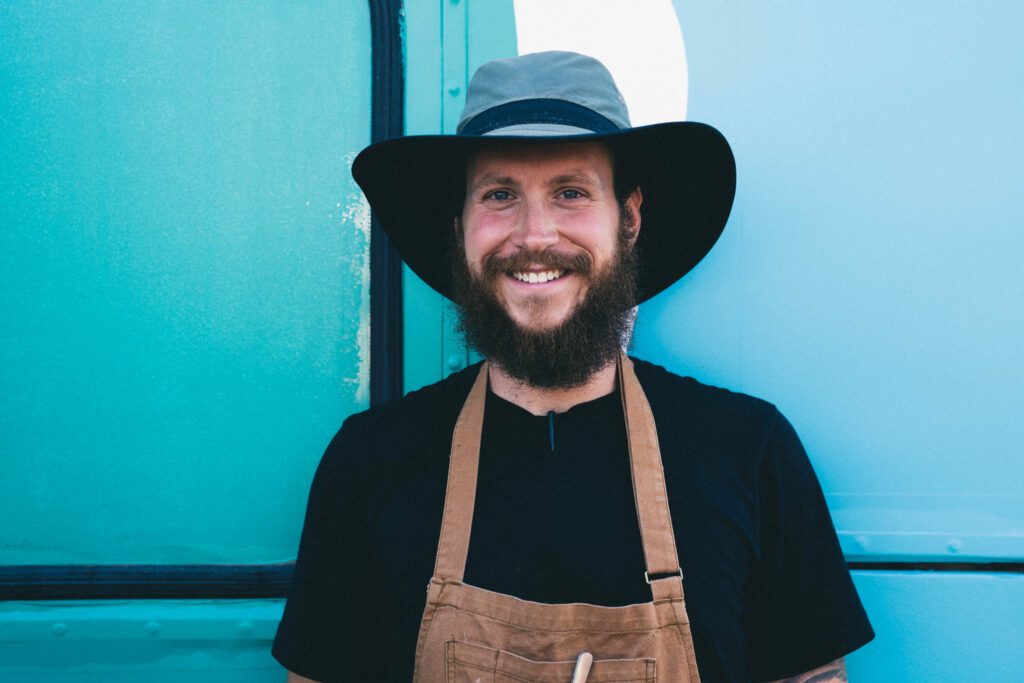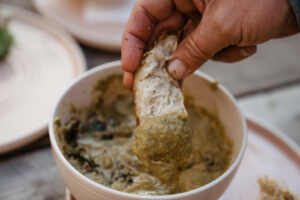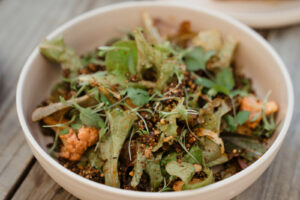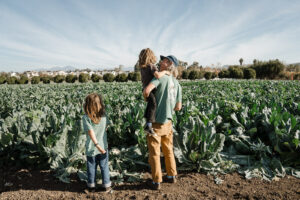We’re creating something new and different with Campesino—our forthcoming zero-waste, farm-to-table café that will be open to the public 5 days a week starting this fall—and for a project this ambitious, it’s sure to be as challenging as it is exciting. Luckily we’ll have plenty of help from our Culinary Manager, Chef Doug Settle.
Chef Doug has more than 15 years of professional kitchen experience, working at esteemed restaurants such as Searsucker, Bankers Hill Bar & Restaurant, Campfire and more. In his time at The Ecology Center, he’s helped us produce delicious value-added products from surplus produce, create mouthwatering pizzas that reflect the seasonal flavors of the farm at Peace Pizza, and collaborate with guest chefs to make world-class meals from regenerative ingredients at Community Table.
We’re excited to bring Campesino Café to life with Chef Doug’s help this fall, but community members won’t have to wait that long to get a taste of Chef Doug’s cooking, and try the kind of seasonal, regenerative cuisine that we plan to serve when Campesino opens its doors. Chef Doug and the entire culinary team from The Ecology Center will be leading a special Community Table dinner on Friday, August 19th, which will also serve as a fundraiser to support the construction of Campesino.
Click here to get tickets to this Community Table dinner, and read the interview below to get to know Chef Doug.
You’ve been helping design the menu for our new Campesino Café–any sneak peeks you can share?
The café is very exciting. I’m very stoked to be part of this from the ground up. With Campesino, we’re going to be putting the same quality food on a plate that you have at a fine dining restaurant, but it’s for anyone to come by and enjoy. I’m stoked on the simplicity of showing simple food. A lot of the same items will be on the menu throughout the year, but the ingredients will change with each season. I think we’re trying to get up to about 90 percent of ingredients being from the farm. We’ll have a super small offering because of that. The café will be, as Evan likes to call it, “the speaker system for the farm.”
What first sparked your imagination regarding local seasonal ingredients?
I’ve been cooking professionally for 15 years, but I’d say five to seven years of that wasn’t really career-driven. It was just kind of something I hopped into after high school. Moving out here to Southern California opened up this whole world of cooking that I’d never been exposed to. At that point, I realized, “I’ve been doing this my entire life–maybe now I can do it more seriously and help change the world. Support the local economy, treat people in the kitchen a little better than I was treated, and focus on those local, seasonal ingredients.”
How has a regenerative ethos developed the way you cook?
Looking at what the land is producing tells me what to cook. I don’t order through a produce company–we’re using just what Farmer Johnny and his team have produced. It forces me to be much more creative in pairing these flavors together, and how to utilize what’s in surplus in ways I wouldn’t normally use them, like turnips and apples on pizza, or roasted escarole with spiced honey, or roasted Romanesco and kumquats. It’s really a fun thing to be part of, especially to do it on this scale.
In SoCal, we’re a little spoiled in that everything’s “in season” year round. But if you eat a peach right now, versus in 2 or 3 months, it’s going to be a completely different experience. Regenerative farming forces us to rotate crops much more frequently, so your seasons are even shorter, and cover crops force you to think about how to use these cover crops to ramp up the menu or preserve them for the next season.
What drives your passion for regenerative cuisine?
What excites me is that it’s going to leave a better future for chefs. I’m very blessed to be working at The Ecology Center now to create a better future for chefs 20 years from now. We are making the change, turning the tides toward what American cuisine is really going to be, by asking, “What grows great here? What’s the diversity of that going to be?” For example, The Ecology Center is very focused on what indigenous tribes of America and Mexico were growing on this land long before we were here, so we have a big focus here on corn, beans, and squash. That will be very different from the things that grew where I grew up in Eastern Tennessee. It’s going to open up a grand opportunity for people to cook within the seasons.

What do you see as one of the culinary industry’s biggest challenges to caring for the earth?
I would say sourcing. Being a chef is a difficult job already—you choose a low pay, hard work, long hours, and very little glory, unless you make it big. If you’re choosing to source correctly, you’ve chosen the hardest path within an already hard path. Talking to local farmers is much more difficult than calling your produce guy and getting a case of this or that, but it’s what will help make our industry sustainable. So will getting creative: learn to use the off cuts of beef or pork, utilize the fish that not everyone wants to see, ask what surplus you can use.
How can the culinary industry do a better job of caring for people?
That’s a thing I’m still trying to figure out myself! We’ve got a weird view on tipping here in America compared to other countries. Forcing people to rely on their tips to get by isn’t a sustainable model. So I think paying people more evenly across the board, front and back of house, and offering compensation based on experience, and tips split more evenly across the board too.
Talk to your neighbors, even your competitors—if you’re both struggling for business, find a way to cooperate in your schedule so that you both pick up a little extra business. Let’s help each other. Instead of this whole competition thing, let’s work as a community through these challenges. Talking to somebody shouldn’t be difficult, but it is, because it’s different from what we’re used to doing. Creating community is huge.
And just treating people better. When you were yelled at as a young line cook, you didn’t like it—now you’re angry about it, but you think that’s the way things have to be. Those chains have been built within us in the industry over years, and it’s stuff I’m still trying to work on.
As the culinary team is growing, we now have one of the guys lead a breathing exercise for everyone, do a little bit of stretching, take care of our bodies and minds for a minute, and come together as a team before we get into the goals for the day. Healthy competition is nice—let’s push each other to be our best—but having some form of mindfulness before the shift starts is a good thing.
If you could change one aspect of our current food system or culture through your work, what would it be?
I quit a job at one point because we went from working with a local fishmonger in San Diego to placing an order to Las Vegas. I was sitting two blocks from the harbor, calling a guy in the desert to order fish. Creating communication lines with your local purveyors and food chain would change the most. Honestly, I think a lot of these churn and burn restaurants would die because of that–I actually think that would help our industry, as well as our mental health as a society.
When you imagine a food culture that cares for the earth, cares for people, and shares abundance with those in need, what does it look like to you?
It looks like less of this “strive for the Michelin star” accolades, this idea that great food is something on a plate that barely fills you up. It doesn’t take putting something on a plate with tweezers to make it taste great. Taking a vegetable that is this beautiful abstract shape, and cutting it into this perfect tiny square, means all that beauty and nourishment goes to waste. When we start chasing what the food really wants, what the land really wants, I think it would help us cook in a completely different mindset.








